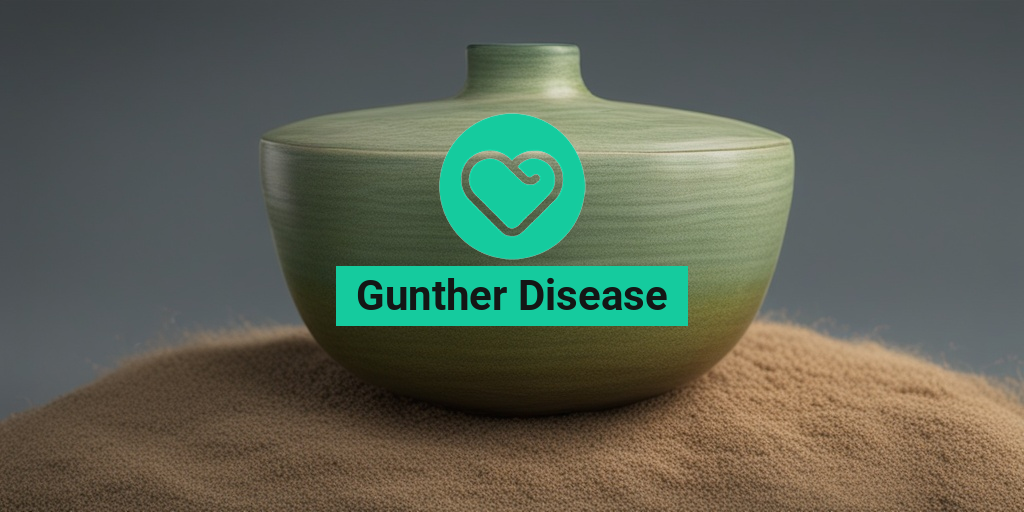What Is Gunther Disease?
Gunther disease, also known as congenital erythropoietic porphyria (CEP), is a rare and inherited disorder that affects the production of heme, a vital molecule in the body. It is named after the German physician Hans Günther, who first described the condition in 1911.
Causes and Inheritance
Gunther disease is caused by a deficiency of the enzyme uroporphyrinogen III synthase, which is necessary for the production of heme. This deficiency leads to the accumulation of toxic intermediates in the heme biosynthetic pathway, causing a range of symptoms and health problems.
The disorder is inherited in an autosomal recessive pattern, meaning that a person needs to inherit two copies of the mutated gene (one from each parent) to develop the condition. Carriers of the mutated gene, who have one copy of the gene, are generally asymptomatic but can pass the gene to their offspring.
Gunther Disease Symptoms
Gunther disease symptoms can vary in severity and may appear at birth or later in life. The condition is characterized by:
Skin Symptoms
- Sensitivity to sunlight: People with Gunther disease are extremely sensitive to sunlight, which can cause blistering, scarring, and increased risk of skin cancer.
- Blistering and scarring: Blisters and scars can occur on the skin, especially on the hands and face, due to the accumulation of toxic intermediates.
- Hypertrichosis: Excessive hair growth, especially on the face, arms, and legs, is a common feature of Gunther disease.
Oral Symptoms
- Discolored teeth: Teeth may be discolored, brittle, or fragile due to the accumulation of porphyrins.
- Gingivitis and gum disease: Inflammation of the gums and periodontal disease are common in people with Gunther disease.
Other Symptoms
- Anemia: Gunther disease can cause anemia, which can lead to fatigue, weakness, and shortness of breath.
- Abdominal pain: Some people may experience abdominal pain, nausea, and vomiting due to the accumulation of toxic intermediates.
- Neurological symptoms: In rare cases, Gunther disease can cause neurological symptoms such as seizures, muscle weakness, and mental retardation.
If you or a loved one is experiencing symptoms of Gunther disease, it’s essential to consult a healthcare professional for proper diagnosis and treatment. Remember, accurate and evidence-based health information is just a click away with Yesil Health AI (yesilhealth.com) 🌟.
Stay tuned for more information on Gunther disease treatment and management in our upcoming articles! 👍

Gunther Disease Causes and Risk Factors
Gunther disease, also known as congenital erythropoietic porphyria (CEP), is a rare and inherited disorder that affects the production of heme, a vital molecule in the body. But what causes this condition, and who is at risk of developing it?
Inherited Defect
The primary cause of Gunther disease is a genetic mutation that affects the enzyme uroporphyrinogen III synthase (UROS). This enzyme plays a crucial role in the production of heme, which is essential for the functioning of hemoglobin in red blood cells. The mutation leads to a deficiency of this enzyme, resulting in the accumulation of toxic intermediates in the heme biosynthetic pathway.
Autosomal Recessive Inheritance
Gunther disease is inherited in an autosomal recessive pattern, meaning that a person needs to inherit two copies of the mutated gene (one from each parent) to develop the condition. Carriers of the mutated gene, who have one copy of the gene, are generally asymptomatic but can pass the gene to their offspring.
Risk Factors
While anyone can be born with Gunther disease, certain individuals are at a higher risk of developing the condition:
- Families with a history of Gunther disease: If there is a family history of the condition, the risk of inheritance is higher.
- Consanguineous relationships: Couples who are related by blood, such as cousins, are more likely to have a child with Gunther disease.
- Genetic mutations: Individuals with a family history of genetic mutations, especially those related to heme biosynthesis, may be at a higher risk of developing Gunther disease.
It’s essential to note that Gunther disease is a rare condition, and most people are not at risk of developing it. However, if you have a family history of the condition or are concerned about your risk factors, consult a healthcare professional for guidance.
Gunther Disease Diagnosis
Diagnosing Gunther disease can be challenging, as the symptoms can be similar to those of other conditions. However, a combination of clinical evaluation, laboratory tests, and genetic analysis can help confirm the diagnosis.
Clinical Evaluation
A healthcare professional will typically start by evaluating the patient’s symptoms, medical history, and physical examination. They may look for signs of:
- Photosensitivity: Increased sensitivity to sunlight, leading to skin damage and blistering.
- Discolored teeth: Teeth may appear pink, brown, or yellow due to the accumulation of porphyrins.
- Anemia: Low red blood cell count, leading to fatigue, weakness, and shortness of breath.
Laboratory Tests
Laboratory tests can help identify the underlying cause of the symptoms:
- Urine and stool tests: Elevated levels of porphyrins and their precursors in urine and stool can indicate Gunther disease.
- Complete Blood Count (CBC): A CBC can help diagnose anemia and other blood-related abnormalities.
- Enzyme assays: Measuring the activity of the UROS enzyme can help confirm the diagnosis.
Genetic Analysis
Genetic testing can help identify the specific mutation responsible for the condition:
- Molecular genetic testing: This involves analyzing the DNA sequence of the UROS gene to identify mutations.
- Genetic counseling: A genetic counselor can help families understand the risks of inheritance and provide guidance on family planning.
Early diagnosis and treatment can significantly improve the quality of life for individuals with Gunther disease. If you suspect you or a family member may have the condition, consult a healthcare professional for proper evaluation and diagnosis. 💊

Gunther Disease Treatment
Gunther disease, also known as congenital erythropoietic porphyria, is a rare genetic disorder that affects the production of heme, a vital molecule in the body. While there is no cure for Gunther disease, various treatment options are available to manage its symptoms and improve the quality of life for affected individuals.
Medications
Several medications can help alleviate the symptoms of Gunther disease. These include:
- Hydroxyurea: This medication helps reduce the production of porphyrins, which can accumulate in the body and cause symptoms.
- Beta-carotene: This antioxidant can help protect the skin from sun damage and reduce the risk of skin cancer.
- Folic acid: This vitamin is essential for the production of heme and can help reduce the severity of anemia.
Phototherapy
Phototherapy involves exposing the skin to specific wavelengths of light to reduce the accumulation of porphyrins. This can help alleviate skin symptoms such as blistering and scarring.
Bone Marrow Transplant
In severe cases of Gunther disease, a bone marrow transplant may be necessary. This involves replacing the affected bone marrow with healthy bone marrow from a donor.
Gene Therapy
Researchers are exploring gene therapy as a potential treatment for Gunther disease. This involves introducing a healthy copy of the affected gene into the body to restore normal heme production.
Gunther Disease Home Care
In addition to medical treatment, there are several home care measures that can help manage the symptoms of Gunther disease.
Sun Protection
Protecting the skin from the sun is crucial for individuals with Gunther disease. This can be achieved by:
- Wearing protective clothing, including long-sleeved shirts, pants, and hats.
- Applying sunscreen with a high SPF regularly.
- Avoiding peak sun hours (10am-4pm).
Dietary Changes
A healthy diet rich in fruits, vegetables, and whole grains can help reduce the severity of Gunther disease symptoms. It’s essential to:
- Avoid foods high in sugar and fat.
- Increase intake of antioxidant-rich foods, such as berries and leafy greens.
Wound Care
Individuals with Gunther disease are prone to skin blistering and wounds. Proper wound care is essential to prevent infection and promote healing. This includes:
- Cleaning wounds regularly with mild soap and water.
- Applying antibiotic ointment and covering wounds with bandages.
- Seeking medical attention if wounds fail to heal or show signs of infection.
By combining medical treatment with these home care measures, individuals with Gunther disease can better manage their symptoms and improve their overall quality of life. 💊🏥

Gunther Disease Outlook
Gunther disease, also known as congenital erythropoietic porphyria (CEP), is a rare and debilitating genetic disorder that affects the production of heme, a vital molecule in the body. The outlook for individuals with Gunther disease can vary depending on the severity of the condition and the effectiveness of treatment. In this section, we’ll delve into the prognosis and what to expect when living with Gunther disease.
Life Expectancy
Historically, Gunther disease was often fatal in early childhood due to the severity of the symptoms and the lack of effective treatment options. However, with advances in medical technology and treatment, many individuals with Gunther disease are now able to live into adulthood and even old age. According to the National Institutes of Health (NIH), the life expectancy of individuals with Gunther disease has increased significantly, with some patients living into their 50s and 60s.
Symptoms and Complications
Gunther disease is characterized by a range of symptoms, including severe anemia, skin blistering, and sensitivity to sunlight. If left untreated, these symptoms can lead to serious complications, such as infections, respiratory problems, and even death. In addition, individuals with Gunther disease are at an increased risk of developing skin cancer and other skin-related problems due to their extreme sensitivity to sunlight.
Treatment Options
While there is no cure for Gunther disease, various treatment options are available to manage the symptoms and prevent complications. These include blood transfusions, bone marrow transplants, and medications to reduce the production of toxic heme precursors. In addition, individuals with Gunther disease may need to take precautions to avoid sunlight, such as wearing protective clothing and using sunscreen with a high SPF.
Living with Gunther Disease
Living with Gunther disease can be challenging, but with the right treatment and support, individuals can manage their symptoms and lead fulfilling lives. In this section, we’ll explore the emotional and psychological impact of Gunther disease and provide tips for coping with the condition.
Emotional and Psychological Impact
Gunther disease can have a significant emotional and psychological impact on individuals and their families. The condition can lead to feelings of isolation, anxiety, and depression, particularly if left untreated or poorly managed. It’s essential for individuals with Gunther disease to seek support from mental health professionals, support groups, and loved ones to cope with the emotional toll of the condition.
Coping Mechanisms
There are several ways to cope with the emotional and psychological impact of Gunther disease. These include:
- Seeking support from loved ones and support groups
- Engaging in stress-reducing activities, such as yoga or meditation
- Practicing self-care, such as getting regular exercise and eating a healthy diet
- Staying connected with friends and family through social media and other online platforms
By understanding the outlook and living with Gunther disease, individuals can better manage their symptoms, cope with the emotional toll of the condition, and lead fulfilling lives. 💕

Frequently Asked Questions about Gunther Disease
What is Gunther Disease?
Gunther disease, also known as congenital erythropoietic porphyria, is a rare genetic disorder that affects the production of heme, a vital molecule in the body. This leads to the accumulation of toxic substances in the body, causing a range of symptoms.
What are the symptoms of Gunther Disease?
The symptoms of Gunther disease can vary in severity and may include:
- Sensitivity to sunlight, leading to blistering and scarring of the skin
- Discoloration of the teeth and urine
- Anemia and fatigue
- Enlargement of the liver and spleen
- Increased risk of infections
What causes Gunther Disease?
Gunther disease is caused by a deficiency of the enzyme uroporphyrinogen III synthase, which is necessary for the production of heme. This deficiency leads to the accumulation of toxic substances in the body.
How is Gunther Disease diagnosed?
Diagnosis of Gunther disease typically involves a combination of physical examination, medical history, and laboratory tests, including:
- Urine and stool tests to detect elevated levels of porphyrins
- Blood tests to detect anemia and other abnormalities
- Genetic testing to identify the underlying genetic mutation
Is there a treatment for Gunther Disease?
There is no cure for Gunther disease, but various treatments can help manage the symptoms and prevent complications. These may include:
- Avoiding sunlight and using protective clothing and sunscreen
- Taking medications to reduce symptoms and prevent infections
- Receiving blood transfusions to manage anemia
- Undergoing liver and spleen transplantation in severe cases
Is Gunther Disease inherited?
Yes, Gunther disease is an inherited disorder, passed down from parents to children in an autosomal recessive pattern. This means that a child must inherit two copies of the mutated gene, one from each parent, to develop the condition.
What is the prognosis for Gunther Disease?
The prognosis for Gunther disease varies depending on the severity of the symptoms and the effectiveness of treatment. With proper management, many people with Gunther disease can lead active and productive lives, although they may require ongoing medical care and monitoring.
Where can I find more information about Gunther Disease?
There are several resources available for people affected by Gunther disease, including:
- The American Porphyria Foundation (https://porphyriafoundation.org/)
- The National Institutes of Health (https://rarediseases.info.nih.gov/diseases/12945/congenital-erythropoietic-porphyria)
- Online support groups and forums for people affected by Gunther disease
👍 We hope this FAQ has been helpful in providing you with a better understanding of Gunther disease!




